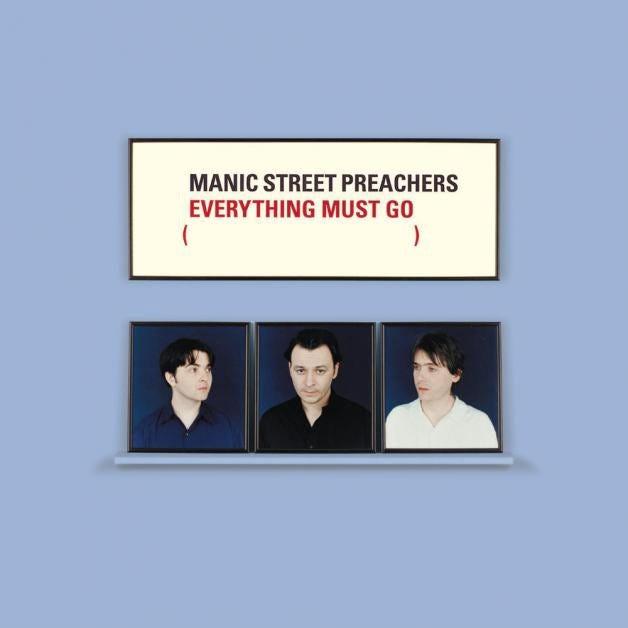Manic Street Preachers — Everything Must Go— 1996
09.February.2021
Manic Street Preachers
Everything Must Go
1996
Released 1.5 years after the disappearance of rhythm guitarist and co-lyricist (with bass player Nicky Wire) Richey Edwards, Everything Must Go was a noticeable departure from the stunted, claustrophobic sound of its predecessor 1994’s The Holy Bible.
After encouragement from the Edwards family for the band to carry on, the three remaining Manics — guitarist and singer James Dean Bradfield, bassist Nicky Wire, and drummer Sean Moore got together with producer Mike Hedges (The Cure, Sarah Brightman) at his studio in Normandy, France.
The resulting album, Everything Must Go, is a departure both lyrically and musically for the band. And it works to the band’s advantage. The album has a more expansive sound than any of their previous work, which may account for the working title of Sounds in the Grass (based on a Jackson Pollack series).
According to Nicky Wire:
“With Everything Must Go in the way we talked about it, we were the most timid we’d ever been because we were very nervous. It was strange because it was the most un-Manics we’ve been about in an album, and then it was the most successful.”
A song like “A Design For Life” has a big, bold sound that embraces both synths and strings and yet sounds completely earnest with its anthemic rock refrain:
We don’t talk about love
We only wanna get drunk
And we are not allowed to spend
As we are told that this is the end
A design for life
A design for life
A design for life
A design for life
The music for the rest uses a large canvas; from the acoustic “Elvis Impersonator: Blackpool Pier” (an indictment on England’s fascination with American culture) to a slight return to melodic punk form with “Further Away” to the poignant “Interiors,” a tribute to artist Willen de Kooning (inspired by a documentary on De Kooning’s experience with Alzheimer’s, which apparently left him unable to remember what he had painted).
Lyrically, the songs on the record have lyrics that mirror the band's shift. There are five songs with Richey Edwards lyrics here (a practice the band would keep until 2009’s Journal for Plague Lovers). However, Edwards's more introspective and autobiographical lyrics have been replaced by Nicky Wire’s fondness for historical and political themes.
Released in May of 1996, Everything Must Go was an immediate success, debuting at #2 on the UK Albums Chart. While the album expanded their sound and their lyrics, it also extended their fan base. The record gave the band a whole new generation of fans across Europe, Asia, and Australia.
But not in the United States.
Everything Must Go spawned five singles:
“A Design for Life”
“Everything Must Go”
“Kevin Carter”
“Further Away” — Japan only
“Australia”
The album was universally applauded. Rolling Stone critic David Fricke said the album was the “most underrated album of the year,” describing it as “a record of painstaking melodic craft and thundering execution, a proclamation of physical and emotional cleansing.”
Vox magazine’s Mark Sutherland described Everything Must Go as a “record so superb it might just make intelligence fashionable again.”
Everything Must Go gave Manic Street Preachers the very thing they deserved most — an audience. They would find even more success with their next album, This Is My Truth Tell Me Yours, and have maintained a large and rabid audience worldwide.
But not in the United States.
Rabid? Yes.
Large? Not so much.
The legacy of Everything Must Go is large. It consistently ranks as one of the greatest British albums of all time:
Q Magazine — #39 in its list of the 100 Greatest British Albums Ever, #16 on its list of the best albums released in the magazine’s lifetime.
Kerrang! — #24 on their list of 100 Best British Rock Albums Ever.
Melody Maker — #41 on its list of All Time Top 100 Albums.





